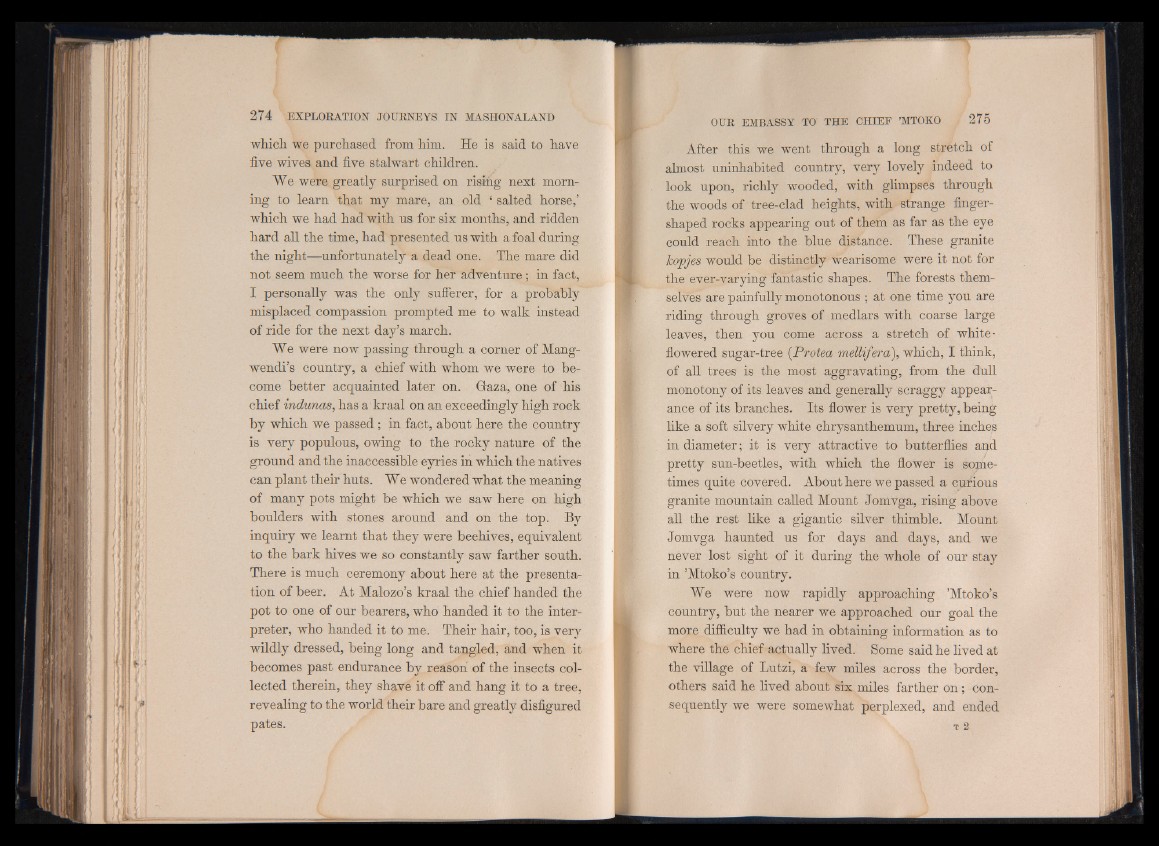
which, we purchased from him. He is said to have
five wives and five stalwart children.
We were greatly surprised on rising next morning
to learn that my mare, an old ‘ salted horse,’
which we had had with us for six months, and ridden
hard all the time, had presented us with a foal during
the night—unfortunately a dead one. The mare did
not seem much the worse for her adventure; in fact,
I personally was the only sufferer, for a probably
misplaced compassion prompted me to walk instead
of ride for the next day’s march.
We were now passing through a corner of Mang-
wendi’s country, a chief with whom we were to become
better acquainted later on. Gaza, one of his
chief indunas, has a kraal on an exceedingly high rock
by which we passed ; in fact, about here the country
is very populous, owing to the rocky nature of the
ground and the inaccessible eyries in which the natives
can plant their huts. We wondered what the meaning
of many pots might be which we saw here on high
boulders with stones around and on the top. By
inquiry we learnt that they were beehives, equivalent
to the bark hives we so constantly saw farther south.
There is much ceremony about here at the presentation
of beer. At Malozo’s kraal the chief handed the
pot to one of our bearers, who handed it to the interpreter,
who handed it to me. Their hair, too, is very
wildly dressed, being long and tangled, and when it
becomes past endurance by reason of the insects collected
therein, they shave it off and hang it to a tree,
revealing to the world their bare and greatly disfigured
pates.
After this we went through a long stretch of
almost uninhabited country, very lovely indeed to
look upon, richly wooded, with glimpses through
the woods of tree-clad heights, with strange finger-
shaped rocks appearing out of them as far as the eye
could reach into the blue distance. These granite
kopjes would be distinctly wearisome were it not for
the ever-varying fantastic shapes. The forests themselves
are painfully monotonous ; at one time you are
riding through groves of medlars with coarse large
leaves, then you come across a stretch of white-
flowered sugar-tree (Protea mellifera), which, I think,
of all trees is the most aggravating, from the dull
monotony of its leaves and generally scraggy appearance
of its branches. Its flower is very pretty, being
like a soft silvery white chrysanthemum, three inches
in diameter; it is very attractive to butterflies and
pretty sun-beetles, with which the flower is sometimes
quite covered. About here we passed a curious
granite mountain called Mount Jomvga, rising above
all the rest like a gigantic silver thimble. Mount
Jomvga haunted us for days and days, and we
never lost sight of it during the whole of our stay
in ’Mtoko’s country.
We were now rapidly approaching ’Mtoko’s
country, but the nearer we approached our goal the
more difficulty we had in obtaining information as to
where the chief actually lived. Some said he lived at
the village of Lutzi, a few miles across the border,
others said he lived about six miles farther on ; consequently
we were somewhat perplexed, and ended